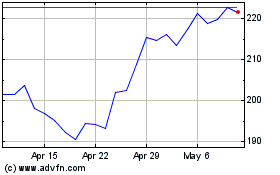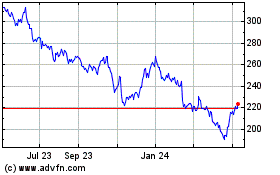Biogen: 5 More Cases Of Brain Infection In Tysabri Patients
18 November 2010 - 5:23AM
Dow Jones News
Biogen Idec Inc. (BIIB) disclosed five more cases of a rare
brain infection in multiple sclerosis patients on Tysabri, which it
sells with Elan Corp. (ELN), bringing the total number of cases to
75 as of Nov. 2.
The Weston, Mass., biotech company also reported an additional
death among patients that have developed the infection--known as
progressive multifocal leukoencephalopathy, or PML--a number that
is now 15.
The number of PML cases is important because if the infection
rate climbs too high, the drug's sales growth may drop. Regulators
have said that they watch the cases, but have concluded that the
benefits of the medicine to MS patients outweigh the risks.
The overall global PML rate is about 0.96 per 1,000 patients, a
company spokeswoman said, which still falls within the 1-in-1,000
rate previously seen in clinical trials and implied on the drug's
label. But the rate has been rising, and multiple Wall Street
analysts raised concern about the trend on Wednesday as the MS
market is becoming increasingly competitive.
"Given this PML rate increase, we expect it to cross the 1/1000
incidence threshold sometime during the next two months," Barclays
Capital analyst Jim Birchenough said in a note to clients.
Food and Drug Administration officials weren't immediately
available for comment.
Sales of Tysabri are important to the future growth of Biogen
and Elan. There is hope that the development of a blood test may
better determine the chances of patients contracting PML. Although
the overall risk of the infection is small, the test may make
patients and physicians more comfortable with using the drug.
Tysabri is considered to be a highly effective therapy for
multiple sclerosis, but its growth has been stunted by concerns
about PML. The drug was temporary withdrawn from the market
beginning in 2005 and relaunched in 2006 with a strict access plan
that monitors every patient using the drug.
Meanwhile, the MS treatment market is getting increasingly
competitive, something that Wall Street believes could put some
pressure on Tysabri and Biogen as a whole. Biogen get most of its
revenue from MS treatments Avonex and Tysabri, and hasn't launched
a new drug since the approval of Tysabri in 2004.
Novartis AG's (NVS) Gilenya, the first oral therapy for the
disease, was recently approved, and numerous other therapies are in
development.
Earlier this month, Biogen unveiled a sweeping restructuring
plan that cuts costs--including facility closings and layoffs--and
focuses the company on developing neurology treatments and
defending its current franchise of MS drugs.
The moves came after a business review by new Chief Executive
George Scangos, who joined the company in July.
As of Sept. 30, 55,100 patients were using the drug around the
world. In total, about 75,500 patients have used the drug since its
launch.
Of the total PML cases, 33 were in the U.S., 38 were in the
European Union and four were in other areas.
The risk of the infection increases with the number of monthly
infusions that a patient receives, but that rate appears to drop
after 30 months of use. Biogen views the drop as inconclusive,
because there aren't enough patients at the longer duration to have
enough confidence in that finding.
The most recent data update translates to a rate of 1.49 cases
per 1,000 for patients on the drug for a year or longer, but rises
to 1.97 per 1,000 for those on the drug for two years or
longer.
Looked at another way, the rate is about 1.49 cases per 1,000
patients on the drug for between two and three years. The incidence
is about 0.37 case per 1,000 patients in those using it for one to
two years, and it is essentially nonexistent in patients using it
for less than a year.
-By Thomas Gryta, Dow Jones Newswires; 212-416-2169;
thomas.gryta@dowjones.com
Biogen (NASDAQ:BIIB)
Historical Stock Chart
From Mar 2024 to Apr 2024

Biogen (NASDAQ:BIIB)
Historical Stock Chart
From Apr 2023 to Apr 2024
